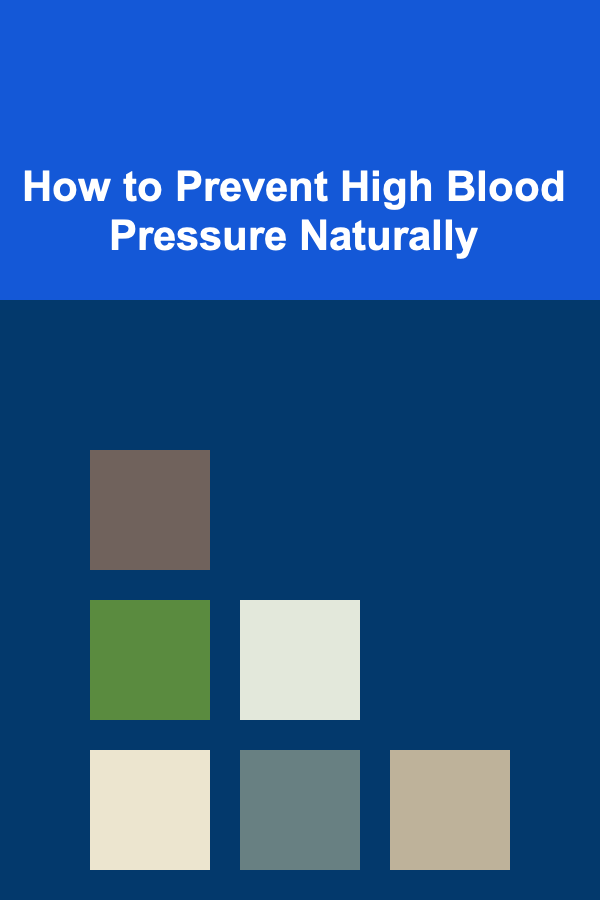
How to Prevent High Blood Pressure Naturally
ebook include PDF & Audio bundle (Micro Guide)
$12.99$11.99
Limited Time Offer! Order within the next:

High blood pressure, or hypertension, is a significant health concern worldwide. Often referred to as a "silent killer," hypertension can lead to serious health complications like heart disease, stroke, kidney damage, and more if not managed effectively. While medication plays a crucial role in controlling high blood pressure for many individuals, natural methods of prevention can complement or even reduce the need for pharmacological treatments. Adopting a holistic approach to preventing high blood pressure naturally is not only effective but can also improve overall health and well-being. This article explores several lifestyle modifications and natural strategies that can help in preventing high blood pressure.
Understanding High Blood Pressure
Before we delve into natural ways to prevent high blood pressure, it's essential to understand what it is and why it happens. Blood pressure is the force exerted by circulating blood on the walls of blood vessels. It is measured using two values:
- Systolic pressure: The pressure in the arteries when the heart beats and pumps blood.
- Diastolic pressure: The pressure in the arteries when the heart rests between beats.
A normal blood pressure reading is typically around 120/80 mmHg . High blood pressure is diagnosed when readings consistently exceed 130/80 mmHg.
Hypertension can be primary (essential) or secondary. Primary hypertension develops gradually over many years and has no identifiable cause, while secondary hypertension is often caused by an underlying condition like kidney disease or hormonal disorders.
The Risk Factors for High Blood Pressure
Several factors contribute to the development of high blood pressure, including:
- Age: As people get older, the risk of high blood pressure increases.
- Family history: Hypertension tends to run in families, suggesting a genetic predisposition.
- Obesity: Being overweight puts extra strain on the heart and increases blood pressure.
- Poor diet: Diets high in sodium, fats, and processed foods are linked to higher blood pressure.
- Physical inactivity: A sedentary lifestyle contributes to weight gain and poor cardiovascular health.
- Stress: Chronic stress leads to elevated blood pressure over time.
- Smoking and alcohol consumption: Both smoking and excessive drinking can raise blood pressure.
Understanding these risk factors is crucial, as it helps individuals take preventative measures, especially when they are at a higher risk of developing hypertension.
Natural Ways to Prevent High Blood Pressure
3.1. Maintain a Healthy Diet
Diet plays a vital role in managing and preventing high blood pressure. A diet rich in whole foods, fruits, vegetables, lean proteins, and healthy fats can significantly lower the risk of hypertension.
3.1.1. The DASH Diet
The Dietary Approaches to Stop Hypertension (DASH) diet is a proven approach to prevent and manage high blood pressure. This diet focuses on eating nutrient-rich foods while minimizing sodium intake. Key components of the DASH diet include:
- Fruits and Vegetables: These foods are rich in potassium, magnesium, and fiber, which help regulate blood pressure. Aim for at least 4-5 servings of fruits and vegetables daily.
- Whole Grains: Whole grains like oats, quinoa, and brown rice provide fiber and essential nutrients that support heart health.
- Low-Fat Dairy: Low-fat or fat-free dairy products are important sources of calcium and vitamin D, both of which are linked to healthy blood pressure levels.
- Lean Proteins: Sources like chicken, fish, and plant-based proteins like beans and legumes are ideal for managing blood pressure.
- Nuts, Seeds, and Legumes: These foods are rich in healthy fats, fiber, and magnesium, all of which help in reducing hypertension.
3.1.2. Limit Sodium Intake
Reducing salt intake is one of the most important dietary changes you can make to lower blood pressure. The American Heart Association recommends limiting sodium intake to no more than 2,300 milligrams per day , with an ideal limit of 1,500 milligrams for most adults. Avoiding processed foods, canned goods, and restaurant meals can significantly reduce your sodium consumption.
3.1.3. Increase Potassium Intake
Potassium helps balance the effects of sodium in the body and is essential for maintaining healthy blood pressure levels. Foods like bananas, sweet potatoes, spinach, beans, and avocados are excellent sources of potassium.
3.1.4. Reduce Processed Foods and Added Sugars
Processed foods, particularly those high in trans fats, added sugars, and artificial additives, can contribute to hypertension and other cardiovascular issues. Cutting back on sugary beverages, sweets, and fast food can lead to significant improvements in blood pressure.
3.2. Exercise Regularly
Physical activity is one of the most effective natural remedies for high blood pressure. Regular exercise helps maintain a healthy weight, improves circulation, and strengthens the heart, all of which contribute to healthy blood pressure levels.
3.2.1. Aerobic Exercise
Aerobic exercises, such as walking, jogging, cycling, swimming, or dancing, are particularly beneficial for reducing high blood pressure. Aim for at least 150 minutes of moderate aerobic activity per week or 75 minutes of vigorous activity.
3.2.2. Strength Training
Incorporating strength training exercises, like lifting weights or using resistance bands, twice a week can help increase muscle mass and support overall cardiovascular health.
3.2.3. Yoga and Meditation
Yoga, tai chi, and other mindful exercises promote relaxation and reduce stress, which can have a direct positive effect on blood pressure. Regular practice of deep breathing techniques and meditation can also help lower blood pressure by calming the nervous system.
3.3. Maintain a Healthy Weight
Being overweight or obese is one of the leading causes of high blood pressure. Even a modest weight loss---5-10% of your body weight---can have a significant impact on lowering blood pressure. Losing weight through a combination of a healthy diet and regular exercise can improve heart health and reduce the strain on your cardiovascular system.
3.4. Limit Alcohol and Quit Smoking
Both alcohol consumption and smoking are linked to higher blood pressure. Drinking alcohol in moderation or not at all can prevent hypertension. For men, this means up to two drinks per day, and for women, no more than one drink per day.
Smoking causes immediate increases in blood pressure and harms the cardiovascular system in the long term. Quitting smoking improves heart health and helps lower blood pressure over time.
3.5. Reduce Stress
Chronic stress is a major contributor to hypertension. High stress levels can trigger temporary spikes in blood pressure, and over time, this can contribute to sustained high blood pressure. Managing stress effectively is essential for long-term blood pressure control.
3.5.1. Mindfulness and Relaxation Techniques
Mindfulness meditation, progressive muscle relaxation, and deep breathing exercises can activate the body's relaxation response, lowering cortisol levels and reducing blood pressure. Practicing these techniques for even 10-15 minutes a day can significantly help manage stress.
3.5.2. Time Management and Work-Life Balance
Ensuring that you have a healthy work-life balance is another crucial aspect of managing stress. Avoiding overcommitment, taking breaks throughout the day, and setting realistic goals can help prevent burnout and manage stress effectively.
3.6. Get Enough Sleep
Sleep deprivation is closely linked to high blood pressure. Studies show that consistently getting less than 7-8 hours of sleep per night can contribute to increased blood pressure over time. Ensuring good sleep hygiene, such as maintaining a regular sleep schedule and creating a calming bedtime routine, can help support healthy blood pressure levels.
3.7. Herbs and Supplements for Blood Pressure
Certain herbs and supplements have shown promise in supporting healthy blood pressure levels:
3.7.1. Garlic
Garlic is well-known for its cardiovascular benefits. Studies suggest that garlic supplements may help lower blood pressure by improving the elasticity of blood vessels and increasing nitric oxide production. Consuming raw garlic or taking garlic supplements can be beneficial for heart health.
3.7.2. Omega-3 Fatty Acids
Omega-3 fatty acids, found in fatty fish, flaxseeds, and walnuts, have been shown to reduce inflammation and support healthy blood pressure. Adding omega-3-rich foods or taking supplements can help lower blood pressure.
3.7.3. Magnesium
Magnesium plays a role in regulating blood pressure by helping blood vessels relax. Foods rich in magnesium, like leafy greens, nuts, and seeds, can support healthy blood pressure levels. Magnesium supplements may also be useful for individuals who are deficient in this vital mineral.
3.7.4. Coenzyme Q10 (CoQ10)
CoQ10 is an antioxidant that helps improve heart function and reduce blood pressure. Taking CoQ10 supplements may be beneficial for people with hypertension, though it's essential to consult a healthcare provider before starting any new supplement regimen.
3.8. Hydrate Properly
Proper hydration is essential for maintaining blood pressure balance. Dehydration can cause blood vessels to constrict, which may lead to higher blood pressure. Ensure you drink adequate amounts of water throughout the day, especially if you are active or live in a hot climate.
Conclusion
Preventing high blood pressure naturally is entirely possible through a combination of healthy lifestyle changes. By focusing on a balanced diet, regular exercise, weight management, stress reduction, and eliminating harmful habits like smoking and excessive alcohol consumption, individuals can maintain optimal blood pressure levels and reduce their risk of cardiovascular disease.
Moreover, incorporating natural remedies like herbs, supplements, and relaxation techniques can further enhance blood pressure control. Always remember that while natural methods are effective, it's essential to consult a healthcare provider before making significant changes, especially if you already have high blood pressure or other health conditions.

How to Arrange Party Favors That Will Delight Your Guests
Read More
How to Create a LinkedIn Content Strategy for Your B2B Dropshipping Business
Read More
How to Decorate Your Home for the Holidays with Seasonal Flowers
Read More
How to Monetize Your Deep Learning Models for Steady Income
Read More
How to Plan DIY Gifts for Family and Friends
Read More
How to Travel for Free by House Sitting
Read MoreOther Products

How to Arrange Party Favors That Will Delight Your Guests
Read More
How to Create a LinkedIn Content Strategy for Your B2B Dropshipping Business
Read More
How to Decorate Your Home for the Holidays with Seasonal Flowers
Read More
How to Monetize Your Deep Learning Models for Steady Income
Read More
How to Plan DIY Gifts for Family and Friends
Read More